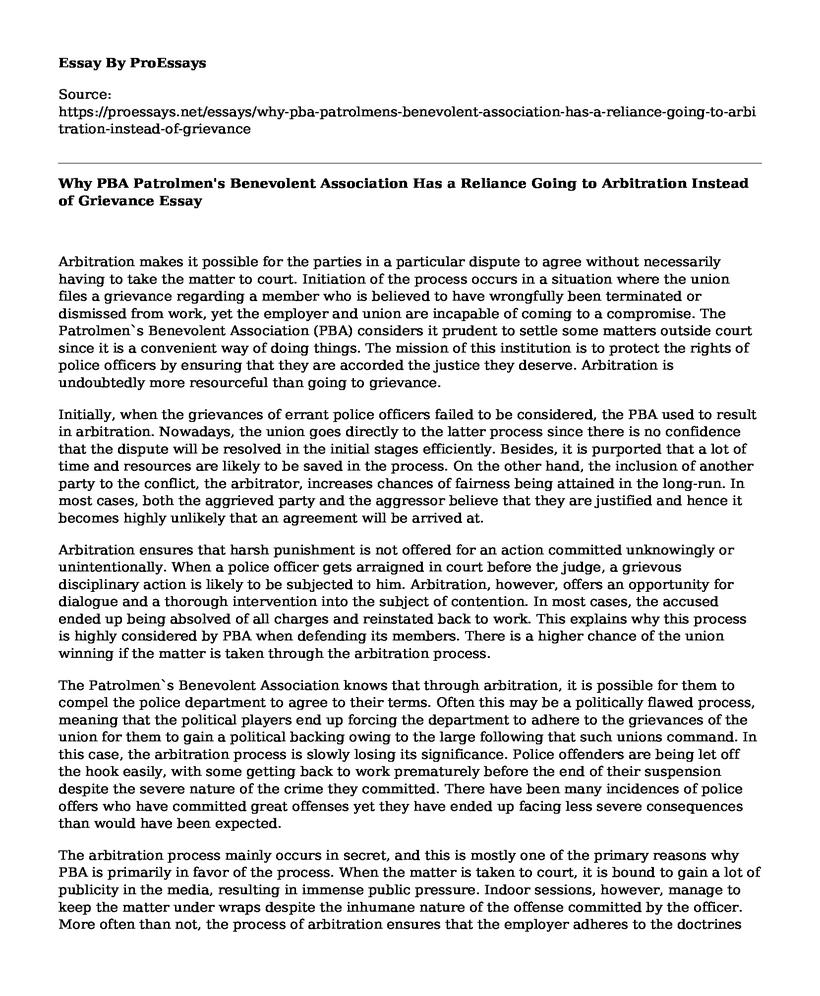Arbitration makes it possible for the parties in a particular dispute to agree without necessarily having to take the matter to court. Initiation of the process occurs in a situation where the union files a grievance regarding a member who is believed to have wrongfully been terminated or dismissed from work, yet the employer and union are incapable of coming to a compromise. The Patrolmen`s Benevolent Association (PBA) considers it prudent to settle some matters outside court since it is a convenient way of doing things. The mission of this institution is to protect the rights of police officers by ensuring that they are accorded the justice they deserve. Arbitration is undoubtedly more resourceful than going to grievance.
Initially, when the grievances of errant police officers failed to be considered, the PBA used to result in arbitration. Nowadays, the union goes directly to the latter process since there is no confidence that the dispute will be resolved in the initial stages efficiently. Besides, it is purported that a lot of time and resources are likely to be saved in the process. On the other hand, the inclusion of another party to the conflict, the arbitrator, increases chances of fairness being attained in the long-run. In most cases, both the aggrieved party and the aggressor believe that they are justified and hence it becomes highly unlikely that an agreement will be arrived at.
Arbitration ensures that harsh punishment is not offered for an action committed unknowingly or unintentionally. When a police officer gets arraigned in court before the judge, a grievous disciplinary action is likely to be subjected to him. Arbitration, however, offers an opportunity for dialogue and a thorough intervention into the subject of contention. In most cases, the accused ended up being absolved of all charges and reinstated back to work. This explains why this process is highly considered by PBA when defending its members. There is a higher chance of the union winning if the matter is taken through the arbitration process.
The Patrolmen`s Benevolent Association knows that through arbitration, it is possible for them to compel the police department to agree to their terms. Often this may be a politically flawed process, meaning that the political players end up forcing the department to adhere to the grievances of the union for them to gain a political backing owing to the large following that such unions command. In this case, the arbitration process is slowly losing its significance. Police offenders are being let off the hook easily, with some getting back to work prematurely before the end of their suspension despite the severe nature of the crime they committed. There have been many incidences of police offers who have committed great offenses yet they have ended up facing less severe consequences than would have been expected.
The arbitration process mainly occurs in secret, and this is mostly one of the primary reasons why PBA is primarily in favor of the process. When the matter is taken to court, it is bound to gain a lot of publicity in the media, resulting in immense public pressure. Indoor sessions, however, manage to keep the matter under wraps despite the inhumane nature of the offense committed by the officer. More often than not, the process of arbitration ensures that the employer adheres to the doctrines laid out in the collective bargaining agreement. Officers who face wrongful termination are hence likely to get a just ruling. Additionally, it is common custom for the loser in the arbitration process to compensate the arbitrator. In such a case, unions have a record of not making exclusive payments to the arbiter. It can hence be implied that the outcome may end up being in favor of the union since the arbitrator knows that the other party is bound to pay up what is owed; though this is not entirely the case. The arbitration is also favorable because the heads of unions along with their lawyers are significantly involved in selecting the arbitrator. They, therefore, know quite well which individual is bound to rule the matter in their favor. This reveals that the process is not as transparent as it has formerly been perceived to be.
Arbitration is indeed very resourceful which explains why the Patrolmen`s Benevolent Association relies on the process instead of going to grievance. The arbitration process consumes less time and funds as opposed to other methods. Besides this, the union has a higher chance of winning in such a process since they have the backing of political elites who ensure that they succeed in the long-run. In some cases, the PBA may be aware of arbiters who are likely to rule in their favor and hence end up ensuring that they are offered the authority to intervene in the matter. The secrecy associated with the process also makes it more attractive since the issue is not likely to be publicized. It is, therefore, evident as illustrated in the above illustrations why the PBA considers arbitration the most efficient way of dealing with conflict between the employer and employee.
Cite this page
Why PBA Patrolmen's Benevolent Association Has a Reliance Going to Arbitration Instead of Grievance. (2022, Mar 29). Retrieved from https://proessays.net/essays/why-pba-patrolmens-benevolent-association-has-a-reliance-going-to-arbitration-instead-of-grievance
If you are the original author of this essay and no longer wish to have it published on the ProEssays website, please click below to request its removal:
- Essay on Dangerous Police Work
- Public Transportation Paper Example
- Using Cell Phones & Traffic Accidents: A Deadly Combination - Essay Sample
- Paper Example on Real Estate Appraisal Reports: Aligning With Logic & Standards
- Paper Example on Police Gratuities: Debates Between Practitioners and Academics
- Cruising and Ocean Liners: Comparing Passengers Ships - Essay Sample
- Free Report on Comparing Murder & Salvation: A Community's Resilience







